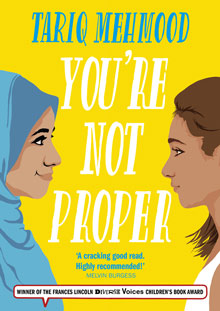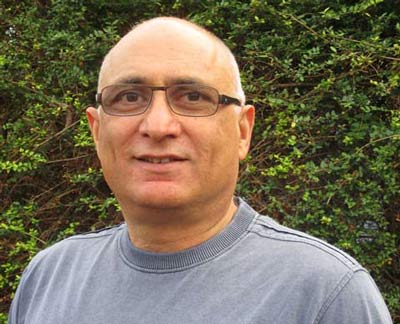BOOK RELEASE
Announcement by HopeRoad Publishing
 YOU’RE NOT PROPER
YOU’RE NOT PROPER
by Tariq Mehmood
(BOOK 1 IN THE ‘STRIKER’ SERIES)
Pub date: Thursday 19 March 2015
Format: B-format Paperback
Genre: Young adult
ISBN: 978-1-908446-30-5
Ebook ISBN: 978-1-908446-37-4
Available on Amazon
‘You’re Not Proper is a real insight into communities more often talked about than listened to. But it’s not just an important book – it’s full of heart and a cracking good read as well. Highly recommended!’
Melvin Burgess
‘Contemporary and hard-hitting, You’re Not Proper is the story of two girls with one religion and two very different lifestyles … High on impact and highly engaging, it truly is a story of our age.’
Jake Hope, critic, librarian and coordinator of the Lancashire Children’s Book of the Year Award
Winner of the Frances Lincoln ‘Diverse Voices’ Children’s Book Award 2014
The Book
Karen thinks she’s not proper white.
Her dad is Pakistani and her mother is white Christian, and somehow she feels as if she doesn’t quite fit in… anywhere. So she’s made a choice: she’s switching sides.
Karen’s going to convert to Islam to find her true identity.
But Shamshad, her Hijab-wearing school mate, isn’t making things easy for her. What’s her deal, anyway? Is Shamshad really any more proper than her?
Trouble and turmoil await in the old textile mill town of Boardhead East, as school battles are replaced by family troubles, name calling turns to physical confrontation and cataclysmic secrets are unveiled.
Set against a backdrop of seething Islamaphobia, You’re Not Proper is the first in the Striker series, written by Tariq Mahmood to shine a light on issues of identity, religion, politics and class affecting young people today – a unique new series in young adult fiction.
Meet the Author Tariq Mehmood in a DUNIA MAGAZINE exclusive Q & A
1- What are the core values that guide you as a Pakistani born Brit?
Many years ago, a kashmiri friend of mine once said, ‘I looked at myself in the mirror for 16 years before I realised I wasn’t white.’
When I was in Pakistan, I never really had to think whether I was a Pakistani or not. But when I got to England, I quickly learnt I was definitely a Paki. In Pakistan, I had no sense of not belonging. I lived in my village, in a Pothohari village, in the state of Punjab. And yes, in a country called Pakistan.
In Pakistan, everyone around me had black hair, But when I got to England, I saw people with blond, brown hair, ginger hair, with pink faces who called themselves white and called me Paki, black, coloured, wog and a whole host of other names. I didn’t know I was any of these until I got here.
After a while I just wanted to hide away from the world in which I had found myself; sometimes in my language, sometimes in whiteness I could never reach, and sometimes in my room or corners of school playgrounds, but I learnt very quickly there was no place of refuge other than in standing up to these things, and as I got older, I wanted my humanity back.
My earlier life in England was filled with being at the end of racist violence; on the way to school; in the bus; in the playground and on the street. Even my white friends at school, were subjected to abuse from racist whites for not joining them.
Through having to resist to survive, I came across people who taught me that the value of life lies in trying to change, and right the wrong of the wronged.
I found peace and strength in the poems of the sufi’s, especially that of Mian Mohammed, who I had heard as a child, but only began to understand when I was a man. And resiliance from the words of Buleh Shah and the shadow of love from Shah Hussien.
In 1967 when I came to England, I was transformed into a Paki. In 2015, I find myself being transformed into Muslim, and tarnished with the brush of terrorism – something I refuse to accept. And this refusal is not just mine, but our children have to confront it on a near daily bases. So I have brought it into my stories.
2- Your soon to be released novel You’re Not Proper touches on both Islam and Christianity, how were you able to represent both religions?
I didn’t set out to represent Christianity or Islam. Those who try to do this, only represent their own interpretation. The issue is not that of Christianity or Islam. As religions there is no threat to either. The issue is how Christianity and Islam are used.
All fictional literary landscapes are political. Each time we select the name of a character, it comes with a history, and in that history there is religion. When we let our character out into the story, it is also embedded into a history, a past , but most importantly in the ‘present’ of the narrative.
I wrote the novel out of questions posed by my children, who couldn’t work out why in Pakistan I was always defending Christians and why in England it was Muslims. I tried to explain that in Pakistan the Christians are discriminated against and brutalised and in Britain Muslims are subjected to racism. And as I was one…
‘But you never go to the mosque,’ my middle daughter interrupted me.
‘I do,’ I corrected her.
‘Yeh, but only when someone dies,’ she replied.
I think this response was a bit harsh, but kids are like that. My children have multiple identities, they can be; Pakistani; Kashmiri, Indian; British; Asian; Black. Religion can be a part of all of these, as in themselves non of the identities are contradictory to each other – the antagonism lies in forces that use these differences for their own ends.
3- Having travelled internationally, what are some commonalities that bind the human race?
We all have a need to tell our stories.
We are human because of our stories. There is no love without a story, and longing is the testimony of the story of love. This is what I think is common to us all – but when in a world where one group of people jet set around the world, and another walk barefoot; where one set of people fill rubbish bins with left overs and discarded food, whilst another’s stomach bloats from hunger, something else is common, the desire for dignity.
4- What do you love most about being a writer and film-maker?
The chance of writing the stories of my friends, the old and the new, the departed and the living, for each one of us has a story that deserves to be told, that needs to be told, and if it is not, then someone elses history becomes the story of our lives.
In my writing and film work, I wish to on the one hand record what I see around me, and on the other to resist that which I see as wrong, and hopefully make a small contribution to making the world a little better.
Tariq Mehmood is an award winning writer and film-maker. His books include Hand On the Sun (Penguin), While There Is Light (Comma). He co-directed the award-winning documentary Injustice. He currently teaches at the American University of Beirut, in Lebanon and lives in Beirut and Manchester.
ABOUT HOPEROAD
HopeRoad, set up in 2012, specialises in writers and writing from and about Africa, Asia and the Caribbean. We give a voice to writers and stories that might otherwise be missed by the mainstream book trade. Website: www.hoperoadpublishing.com

